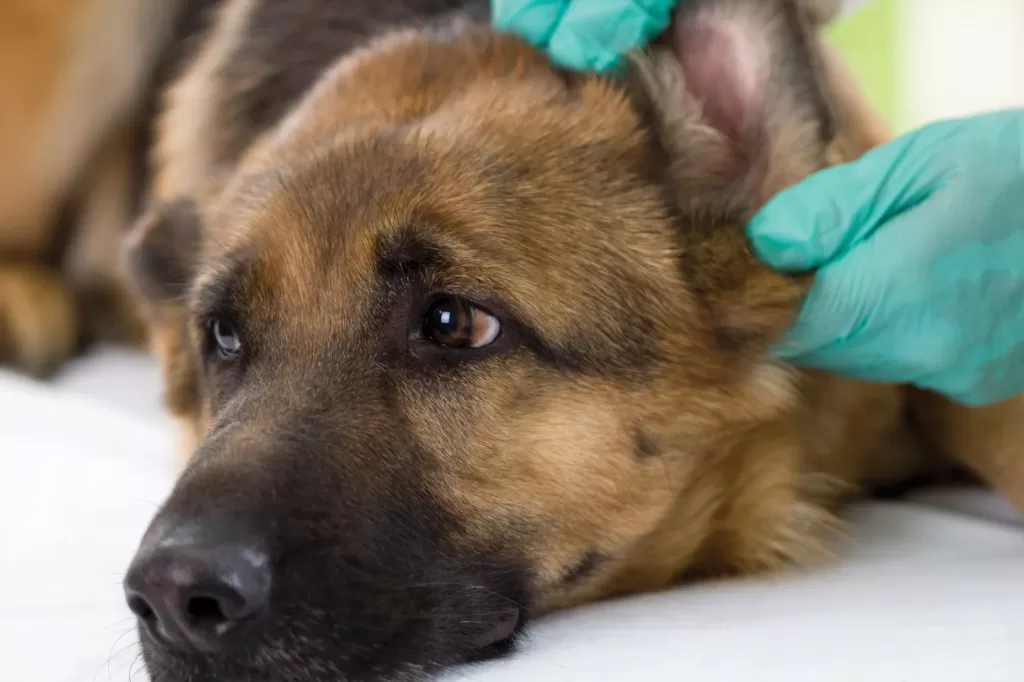Canine Parvovirus in German shepherd dogs is a highly contagious virus that affects dogs with parvovirus (CPV) infection. The virus manifests in two different forms.
Table of Contents
The intestinal form of parvo is very common in dogs, which includes vomiting, diarrhea, weight loss, and loss of appetite (anorexia).
Canine Parvovirus cases are most commonly seen in puppies aged 6 weeks to 6 months. The incidence of parvo infections is drastically reduced by appropriate vaccination and raising in puppies.
Here is what you must know about Parvo in dogs.
Symptoms of Canine Parvovirus for German Shepherd Dogs
The main symptoms associated with the intestinal form of parvo infection are:
- Severe, bloody diarrhea
- Lethargy
- Anorexia
- Fever or hypothermia (low body temperature)
- Vomiting
- Severe weight loss
The intestinal form of Canine parvovirus affects the body’s ability to absorb nutrients. A dog with a parvo dehydrates quickly and is weakened by a lack of nutrients and fluid absorption.
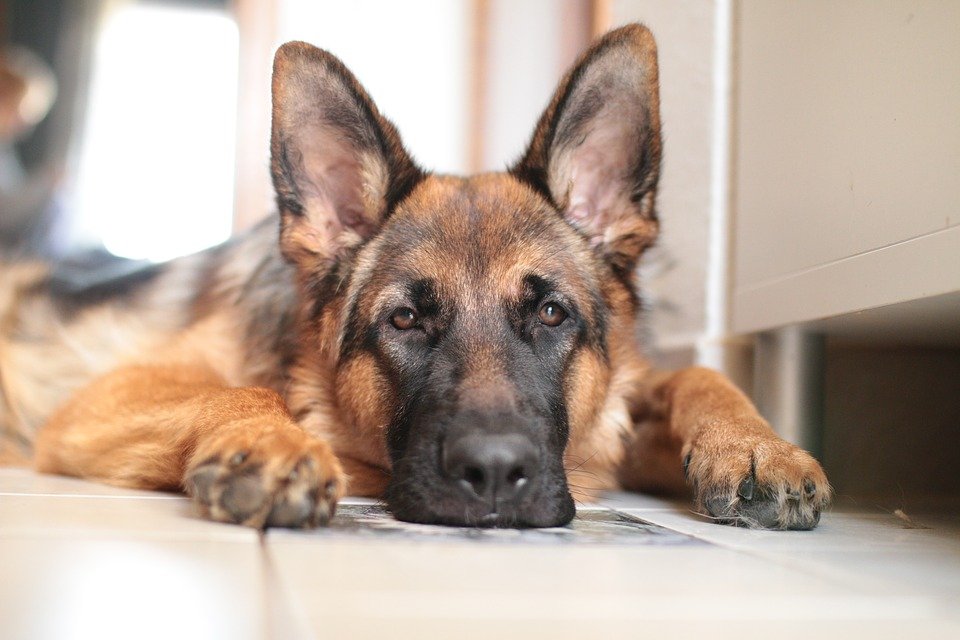
Vomiting and diarrhea often have blood that can be taken to a veterinarian for dogs with parvovirus. The wet tissue of the mouth and eyes may turn red and the heart beats very fast.
When your veterinarian examines your dog’s abdominal area, your dog may respond to pain or discomfort. Dogs infected with CPV may have lower body temperature (hypothermia) than fever.
How can we recognize if our dog has parvovirus?
The symptoms of parvovirus affected dogs are blood-foul-smelling diarrhea, vomiting, loss of appetite, collapse, depression, fever, and sudden death.
Who’s in danger?
Young puppies and unwanted dogs, including those without their booster injections, are at risk of becoming parvo victims.
Puppies go downhill very quickly because the symptoms of Canine parvovirus make them very weak, and their immune systems have to struggle to fight the disease. Young people between the ages of six and six months may also be infected with secondary infections, or they may die of dehydration. Parvo outbreaks are mostly seen in towns and cities with largely uninhabited dogs.
How can I prevent my German Shepherd dog from catching the disease?
Dogs and puppies can be vaccinated against parvovirus from six weeks of age.
A puppy should have their first vaccine by six to eight weeks. Then they need a second vaccine two weeks later. After that, they need a booster vaccine by the age of one.
After this, your vet advises that dogs need booster vaccination once or twice a year. It is essential that your dog does not catch this life-threatening disease.
Vaccination for parvovirus is routine and is one of the three major diseases that dogs are usually vaccinated against. Give your dog a vaccination card with the date of the jab and the date when the next shot is due. It will be signed by your vet or registered veterinary nurse (RVN).
Boosters are important for dogs to stay fresh, but the time between them varies, so check with your vet to see how often your dog is vaccinated.
Vaccinated puppies can also get parvovirus
How can vaccinated dogs get parvo? Puppies need a range of vaccines to create immunity to parvovirus. So if they lose a booster in the puppy vaccine series, they are infected with the parvovirus.
And if they do not continue to receive lifelong boosters as their veterinarian recommended, their antibody levels will fall very low and they will be exposed to parvovirus.
Also Read: Can Older Dogs Get Parvo? YES!!
Some adoptive parents choose to test their dog antibody levels with vaccine titers every year before vaccination. If antibody levels are low, vaccination is recommended.
Viral mutation puppies are susceptible to other strains of the vaccine that are not vaccinated.
That is why your veterinarian wants to replace your puppy even though their records indicate that they were vaccinated.
Is parvovirus treatable?
Since the disease is a 100% viral infection, there is no real cure or proper treatment for it. Parvovirus treatment focuses on treating symptoms and preventing secondary bacterial infections, preferably in a hospital environment.
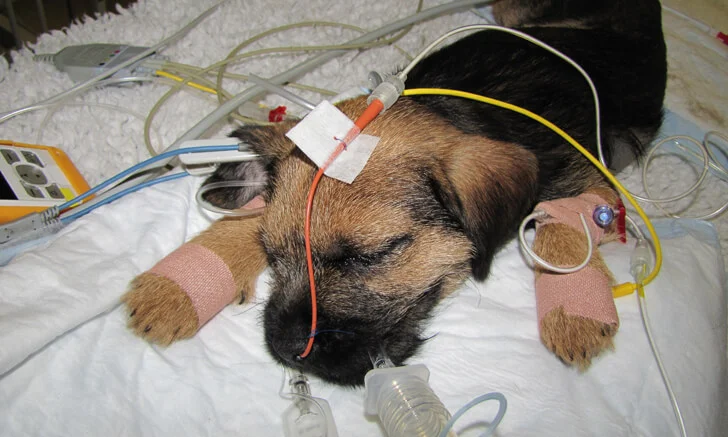
Intensive therapy and systemic support are key to recovery.
Intravenous fluid and nutrition therapy is vital to maintaining the dog’s normal body fluid after severe diarrhea and dehydration. Protein and electrolyte levels are monitored and regulated as needed.
Medications at the hospital used by vets to treat dogs with parvo include vomiting (antiemetics), antacids, gastro protectants, antibiotics and anthelmintics (vet-recommended diverters) to fight parasites.
When treated at a vet hospital, the survival rate in dogs is 70%, but death may be due to severe dehydration, severe secondary bacterial infections, bacterial toxins in the blood, or severe intestinal bleeding.
Diagnosis is low because puppies have low immunity. Unfortunately, a puppy infected with CPV suffers from shock and sudden death.
How to avoid parvo in dogs
The best remedy you can take against parvovirus is to follow the right protocol. Young puppies should be vaccinated from 6-8 weeks of age, and then every three to four weeks to 16 weeks of age. So a puppy who has been vaccinated for 6 weeks will be vaccinated at 9 weeks, 12 weeks and 15 weeks.
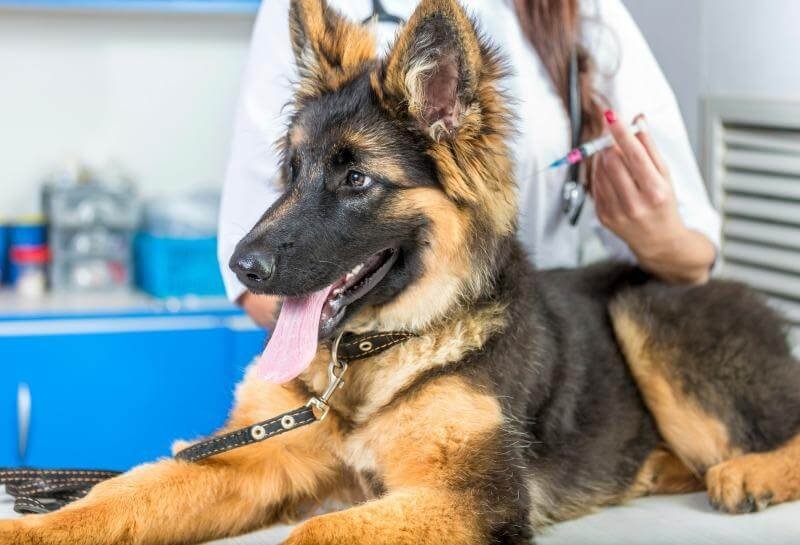
High-risk strains require an initial vaccination period of up to 22 weeks. At this point, your puppy should only meet in private areas with fully vaccinated dogs.
Stay away from all public areas where dogs can spend time, including a dog park, dog beach, pet stores, dog-friendly restaurants, farmer’s markets, and other dog-designated areas.
Always pick up your dog’s feces. This is a good habit to start immediately as it reduces environmental pollution and the spread of intestinal parasites.
Parvovirus is a disease with serious consequences. Rapid action by you and your veterinarian will give your dog the best prognosis for a complete recovery.
Understanding the Unique Resilience of German Shepherds Against Canine Parvo Virus
Lets explore the distinct characteristics that set German Shepherd dogs apart when it comes to handling the Canine Parvo Virus. It delves into why German Shepherds exhibit remarkable resilience to the virus, providing a real-life example of a German Shepherd surviving Canine Parvo and highlighting their unique immunity.
Real-life Example
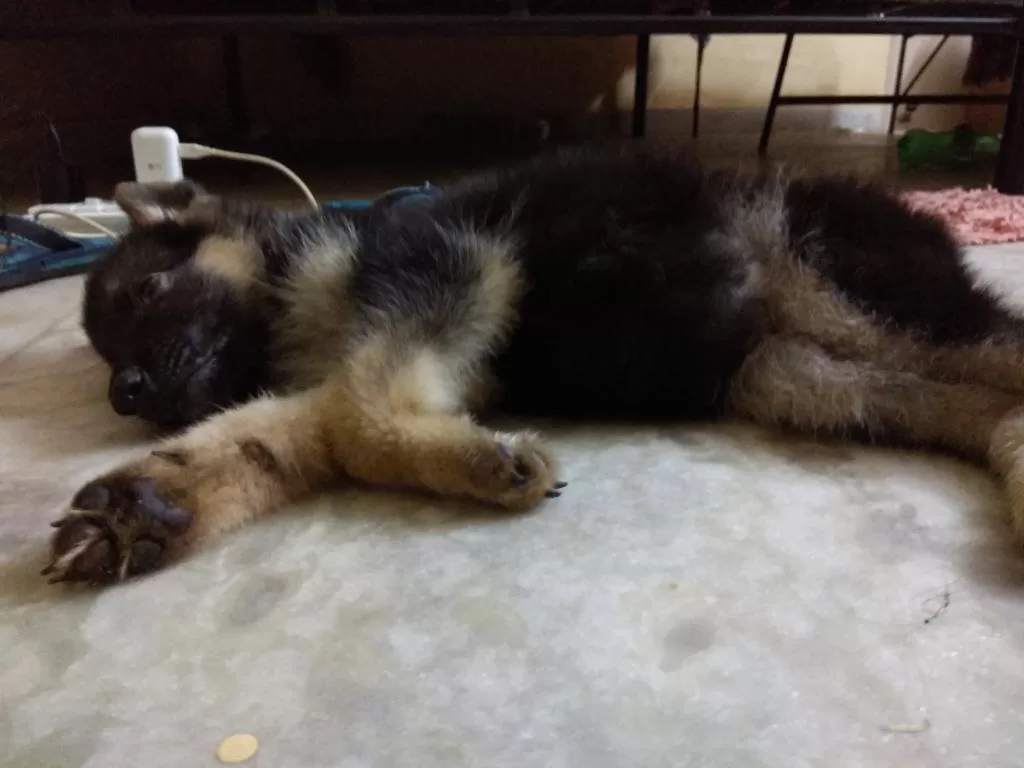
Meet Max, a courageous German Shepherd puppy who faced a severe Canine Parvo Virus infection at just 6 months old. Despite the odds, Max not only survived but made a remarkable recovery. His resilience can be attributed to the breed’s genetic predisposition to robust immune systems. German Shepherds typically possess a strong immune response, allowing them to combat the virus more effectively than some other breeds.
German Shepherd Immunity: German Shepherds have a well-documented history of being highly immune to various diseases, including Canine Parvo. This immunity is linked to their genetics and breeding standards. They often exhibit a stronger immune system response due to their selective breeding for physical and mental traits. While this doesn’t make them completely immune to the virus, it gives them a significant advantage in recovery and survival when infected.
The article aims to shed light on why German Shepherds may fare better against Canine Parvo and emphasizes the importance of vaccination and early detection, even for this resilient breed.
FAQs
What is the most effective method for treating parvo quickly?
The most effective way to treat parvo swiftly is through intensive veterinary care. This typically involves hospitalization, intravenous fluids, medications to control vomiting and diarrhea, and supportive treatments like antibiotics. Prompt veterinary attention is crucial for the best chances of survival.
Is it possible for a dog to recover from parvo without hospitalization?
While some dogs may recover from parvo at home with diligent care, it is generally not recommended. Parvo is a severe and highly contagious disease that can be fatal without timely medical intervention. Home care may include keeping the dog hydrated with electrolyte solutions and offering bland, easily digestible food, but consulting a veterinarian is essential.
Are there natural remedies that can eliminate parvo?
Parvo is a serious viral infection, and relying solely on natural remedies is not advisable. There is no known natural substance that reliably kills the parvovirus. Veterinary treatment is essential for managing parvo effectively and increasing the chances of a dog’s survival.
What kind of food is suitable for dogs recovering from parvo?
Dogs recovering from parvo should be offered bland and easily digestible food to avoid further stressing their digestive system. Veterinarians often recommend a prescription diet or feeding boiled chicken and rice. Ensure the food is well-cooked and free from any spices or seasonings. Gradually reintroduce the dog’s regular diet once they have fully recovered.
How long does the parvo virus typically last in a dog’s system?
The duration of a parvo infection can vary, but the acute phase of the illness usually lasts for about 7-10 days. During this time, the dog will show symptoms like vomiting, diarrhea, and lethargy. However, the virus can persist in the environment for months, posing a risk to other dogs. Proper cleaning and disinfection are essential to prevent further infections.
Wrapping Up
In conclusion, parvo is a highly contagious and potentially life-threatening viral infection in dogs that demands swift and comprehensive medical attention. There is no shortcut or natural remedy that can replace the critical care provided by veterinarians. Timely diagnosis, hospitalization, and treatment are paramount to improving a dog’s chances of survival. While supportive home care can play a role, it should always be guided by a veterinarian’s advice.
Furthermore, it’s important to recognize that prevention is the best approach when dealing with parvo. Ensuring that dogs are up-to-date on their vaccinations and practicing good hygiene, especially in multi-dog environments, can significantly reduce the risk of infection. Remember that every case of parvo is unique, and early intervention remains the key to giving our canine companions the best chance at a healthy recovery.

